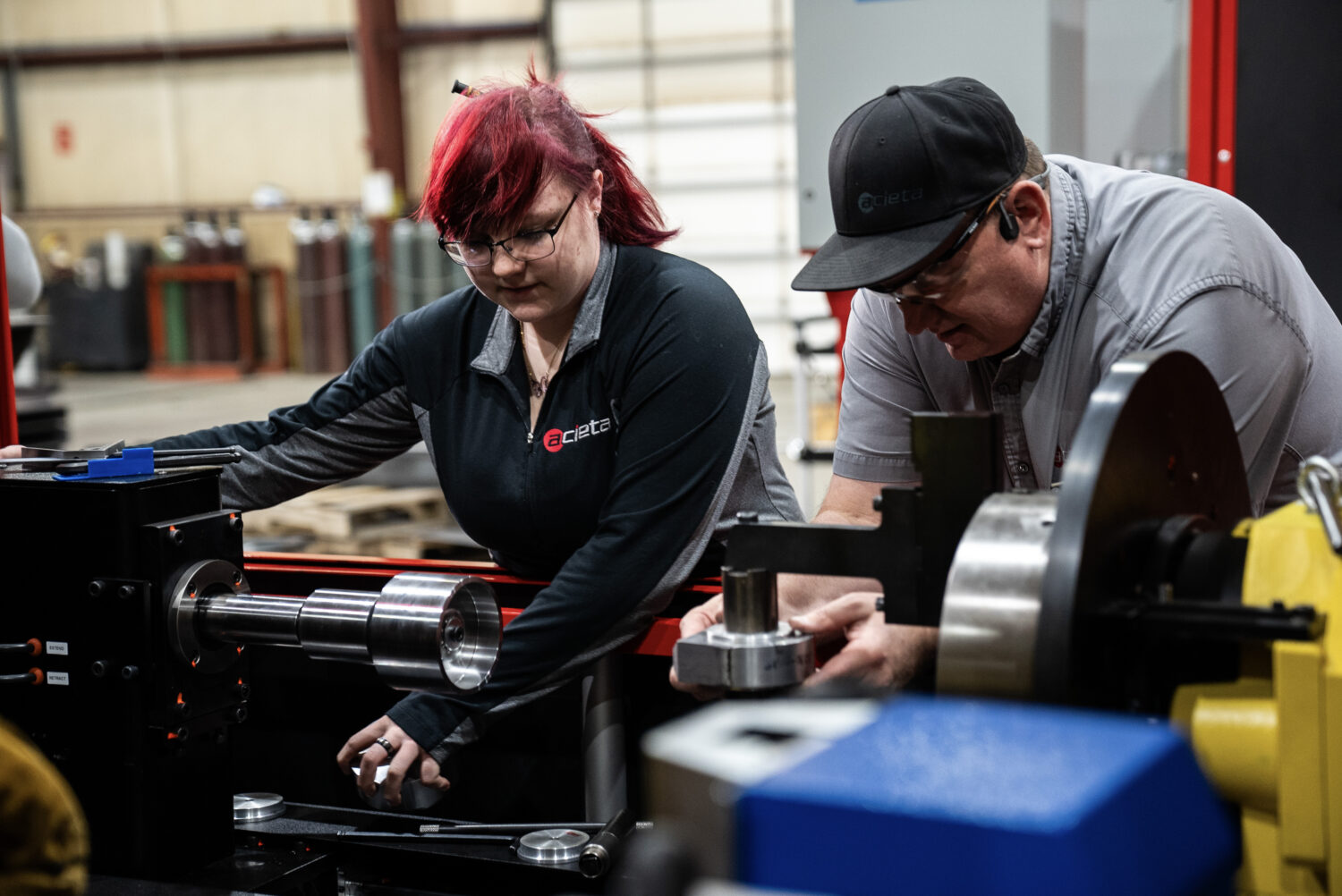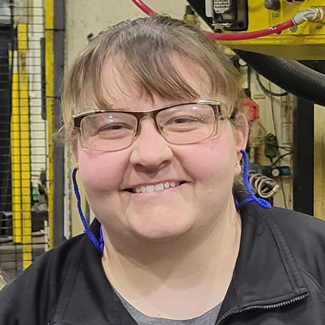
Traditionally, manufacturing jobs have been predominantly filled by men, but today the number of women in manufacturing careers is on the rise. In recognition of Women’s History Month, we highlight some women in robotic automation who are today’s history makers, those laying a foundation for generations to come by contributing to the growth of an essential industry—manufacturing.

Ashley Brockman, Robotic Systems Engineer at Acieta
Q: Why do you like your job?
AB: It’s different every day, and I never know what I’ll walk into. My favorite part is robot programming, figuring out the logic and putting it all together like a puzzle. It feels like I get to play every day. Some days are very stressful, but it’s so rewarding when we figure it out.
Q: How did you get into robotics?
All I knew is that I loved math but I never wanted a desk job. I looked into seven majors to figure out what I wanted to do. I considered accounting, motorsports engineering, math educations, fisheries & wildlife, and even paramedics. My dad is a director at a vocational technology center, and he had just attended a conference that talked about the growing popularity of robotics. It sounded really great to me, so I went to a tech camp before my senior year in high school and got an introduction to robots and program. No one in high school had talked about robotics as a career.
Q: How has your career evolved over time?
AB: I became the first woman at Acieta to achieve the FANUC master certification, which is a great honor. At Acieta, we’re proud to say that we have more FANUC master certified than most system integrators. It takes a lot of time and decication to become master certified, and it make us true masters of our craft.
Q: What advice do you have for young people considering a career in manufacturing?
AB: Don't let manufacturing intimidate you. It's fun if you can prove yourself and earn respect. Take the initiative to learn. Put yourself out there and do not be afraid to fail. It’s surprising how many robots are being used out there, even at small shops in small towns.

Tiona Campbell, Electrical Design Engineer at +Vantage Corporation
Q: Looking back, where did your interest in manufacturing begin?
TC: As a child, I always enjoyed building and creating things, which led my parents to place me in summer classes at the local vocational school. That experience exposed me to different careers, and electrical and electronics stood out to me. So, at the age 9, I started taking electronic classes. We learned to make small AM radios, assembled computers and learned basic electronics. As a teenager, I was apart of an internship, a school-to-work program with the local public utility company where I participated in many departmental rotations. One rotation I liked the most consisted of using computer aided drafting to turn hand drawn maps of underground electrical wires to computer files. I also enjoyed calibrating and testing electrical meters and gas meters used by their field technicans.
Q: How did you get into the automation field?
TC: Soon after I acquired my degree in electrical/electronics technology at Henry Ford Community College, I received a job offer to be a robot programmer. That’s where I got my first look into automotive manufacturing automation, and I fell in love with it. The company had great leadership that allowed me to fuel my curiosity and explore different parts of the company. They let me explore the controls hardware/software side of things, and that’s where I discovered my fondness for hardware electrical design, which is what I do today.
Q: What advice do you have for girls interested in STEM careers?
TC: If you have an interest in understand how technology works, the sky is the limit for you. Technology is expanding and getting better everyday. Always be open to learning and exploring new tech because of the rapid changes in the industry. Don’t be intimidated! Don’t let anyone define who you are! It’s incredible to have the ability to create things from your own thoughts and take pride in it. You’ll be amazed in what you can accomplish.

Meghan McConville, Robotics Systems Engineer at Acieta
Q: What do you like about working in robotic automation?
MM: I love to see a project through from start to finish. I enjoy moving around in the shop and could never sit at a desk all day. There’s a lot of chaotic energy in the shop, and the guys have all accepted me. It makes work fun.
Q: How did you get started in robotics?
I really liked the STEM and hands-on classes in schoolI joined the robotics team in high school and helped from beginning to the end for the robot competition. I learned so much about building a robot from scratch when I first started with no knowledge. I was able to learn and develop my skills that I took to college and then to the workforce.
Q: What was your educational path after high school?
My parents encouraged me to take apprenticeships for cabinet making and to pursue welding as a career so I got a degree at Central Lakes College. Then I went back and got a robotics technology degree, too. My older sister is a robot service technician, which is how I first envisioned it as possible career path for me.

Denise Bethea, Vice President of Human Resources at Robex
Q: How did you first get into the manufacturing industry?
DB: I started out in HR for an apparel company, but then I was hired by a Tier 2 automotive manufacturer to do recruiting and leadership development. That’s the first time I saw automotive manufacturing in action. I wanted to have a better understanding of what the workers do, so a mechanical engineer mentored me, and an industrial engineer took time to teach me how design decisions were made and where HR fits. They invested time in me to help me be successful. Also, I regularly walk the shop floor and learn from employees. One year we were short-staffed during a holiday break so I worked the on the shop floor for a week. I wanted to make sure the workers got their well-deserved vacations, and we’re all a team that helps each other out, no matter where we work in the company.
Q: What do young girls need to know about professional opportunities in manufacturing?
DB: There is a misconception about roles in manufacturing, that girls can’t be professionals beyond working on the shop floor. There are other career paths for young professionals that manufacturing has to offer. For example, you can go into legal, finance, HR, and occupational nursing for manufacturing companies. Don’t believe the old fashioned perceptions of manufacturing as just manual factory work. Things have changed a lot in the last couple decades. Don’t limit yourself to what you think you might know, and be naturally curious.

Karla Gruszynski, Chief Financial Officer at Acieta
Q: What do you like about working in the manufacturing industry?
KG: I like that our company is something tangible, building a product that people need and use. Knowing that we’re creating machines that impact everyone’s daily lives makes me feel good.
Q: Why is it important to encourage more young women to work in manufacturing?
KG: Women can bring a unique perspective to this industry by providing a level of passion and empathy that gets us to our end goal in a different way. Companies can attract more women by offering more flexibility and understanding that most women take on extra responsibilities in life.
Q: What advice do you have for young women considering a career in manufacturing?
Don't be afraid to be the only girl! Follow a career path you love because you can offer a unique perspective. If you are interested in it, you CAN do it and you SHOULD look into it.
Manufacturing careers
The first step to encouraging more women into manufacturing careers is to break the old-fashioned notions of a dirty and dangerous environment. In reality, most of these career opportunities go well beyond the shop floor. Roles in programming, project management, accounting, office management, marketing, and engineering are some examples of essential roles contributing to the company’s overall success.
Together, let us embrace the present, and pave the way for a future where women in robotics and manufacturing continue to shape history with their talent, dedication, and unwavering resolve.
Learn more about manufacturing careers at Acieta, RoBEX, +Vantage and Mid-State Engineering.